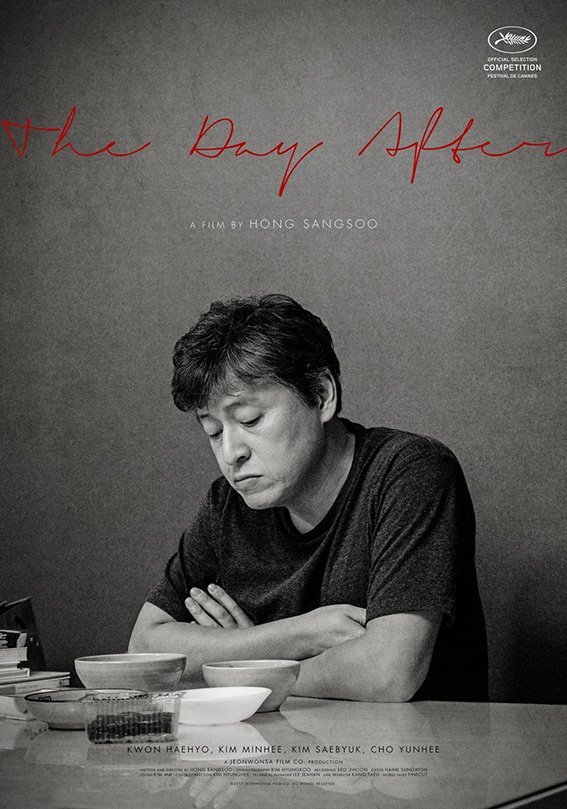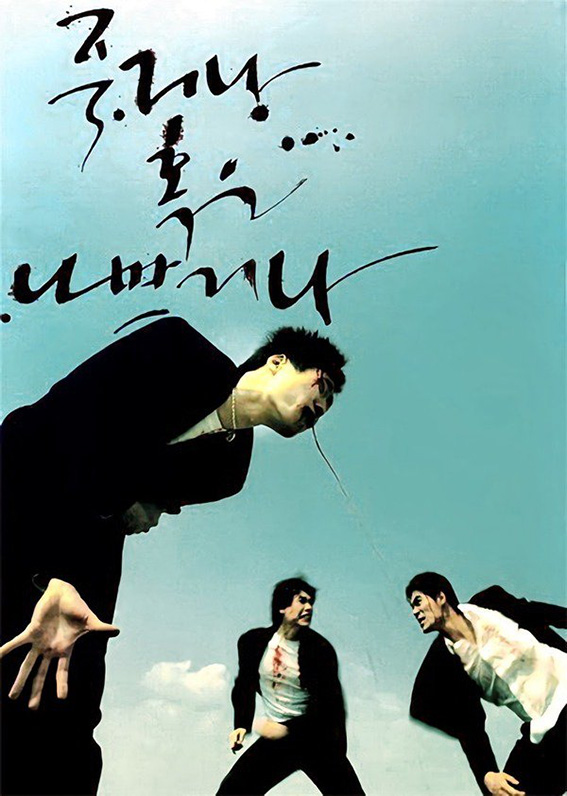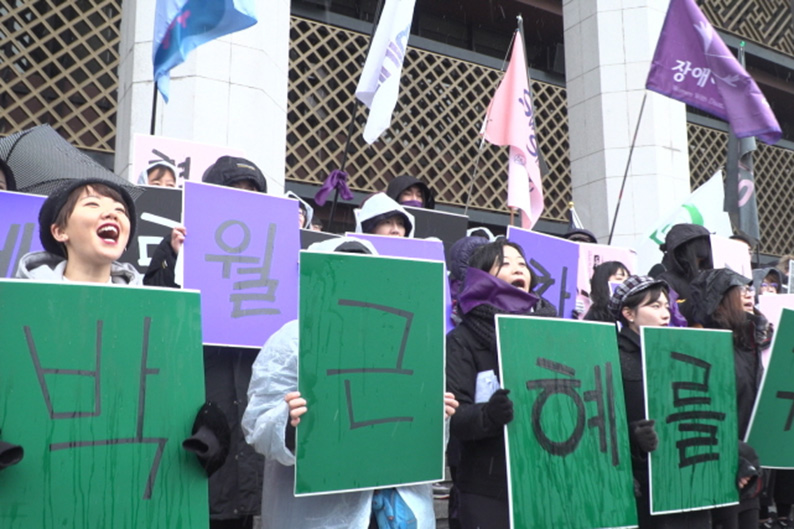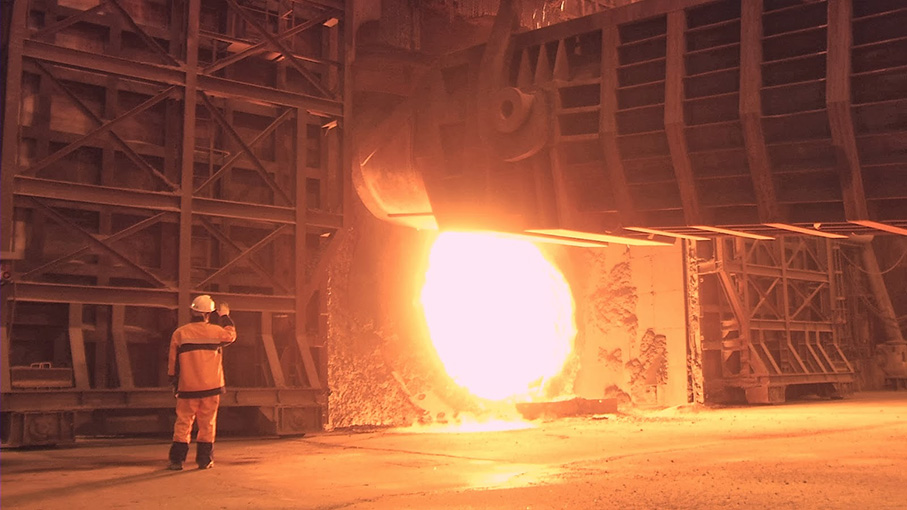The London Korean Film Festival (LKFF) unveiled the lineup for its 12th edition today running 26 October – 19 November with multiple UK and International premieres a special focus on Korean Noir and including everything from Indie Firepower and Cinema Now to Women's Voices, Classics Revisited: Bae Chang-ho Retrospective, Documentaries, Artist Video, Animations, Mise-en-scène Shorts and a roster of very special guests in attendance.
Korea has been in the news more than ever this year with a South Korean presidential impeachment and a change in government, not to mention the current North Korean crisis. Thankfully Korean Cinema has maintained a positive news profile with Bong Joon-ho's creature feature Okja becoming the most widely seen Korean film ever made. So it's no better time for the 12th London Korean Film festival to be back in London and across the UK offering another expansive selection of films from one of the most exciting film industries in the world.

This year’s opening and closing films complement each other as two highly acclaimed dramas presenting unique perspectives on non-traditional romantic relationships – and both star Actress Kim Saebyeok. The UK Premiere of prolific auteur Director Hong Sangsoo's Cannes acclaimed, The Day After (2017) will kick-off the festival at an Opening Gala with Cinematographer and frequent Hong Sangsoo and Bong Joon-ho collaborator, Kim Hyung-ku in conversation on the 26 October. Following bemused characters in matters of the heart, this is "a black & white comedy of missed chances... a Rohmer-esque monochrome comedy of confusion" (Variety). The festival closes on 8 November (in London) with the UK Premiere of emerging director Kim Dae-hwan's Indie relationship hit from Locarno, The First Lap (2017) (followed by Director Q&A), which sees a directionless unmarried couple wade through family encounters and a potential pregnancy, in a fresh verité style that is both funny and heartwarming.
Two out of the five Korean hits to grace Cannes Film Festival this year were crime and action thrillers typical of the booming Korean Noir genre, illuminating the dark side of society: The Villainness (following a female assassin trained from a young age, screening as a special preview at LKFF press launch 11 Sept) and The Merciless (2017, Studiocanal, premiering at LKFF 2017), the latest feature from Byun Sung-hyun, a Tarantino-esque moody neo-noir thriller following double-crossing gangsters. “South Korea has such a turbulent modern history ridden with violence and political, social upheavals... I think that may be why we are good at making thriller movies like this," said Jung Byung-Gil, director of The Villainness” (Daily Mail). It’s fitting that the festival shines a light on the killer genre this year with a full range of crime capers both old and new.
The strand begins with an example of Lee Man-hui’s renowned anti-communist filmmaking, with one of his very early films in the genre, Black Hair (1964), which follows the loyal mistress of a gang boss, whose life takes a horrific turn for the worse after a violent rape is exposed. We are thrilled to be screening the newly restored The Last Witness (1980) that recently screened in Berlin and Busan film festivals, with director Lee Doo-yong in attendance; the film is based on a crime novel by Kim Seong-jung and follows lone wolf Detective Oh Byeong-ho as he goes in search of the murderer of a small time brewer.
Film Noir was thriving in the 1990s, and we’ll celebrate a strong selection from that decade: the darkly humorous Dead End (1993), The Rules of the Game (1994) following small town thugs trying to make it big and Green Fish (1997), the directorial debut by Lee Chang-dong who is now widely regarded as South Korea's greatest living director.

In America, Director Lee Myung-Se was seen as Seoul's answer to Hong Kong's John Woo with his hit, Nowhere to Hide (1999), a highly stylised violent action noir and an influence on The Matrix. Kilimanjaro (2000) is the little seen, but highly accomplished feature from Oh Seung-uk, starring veteran actor Ahn Sung-ki and Park Shin-yang; an engrossing noir following a detective mistaken for his identical twin brother, a gangster. Die Bad (2000) is action maestro Ryoo Seung-wan's sensational debut made in 4 parts over 3 years, following two young men (played by Ryoo and Park Sung-bin) whose lives change forever after a deadly student brawl.
A Bittersweet Life (2005) is Kim Jee-woon's follow up to A Tale of Two Sisters (2003), a thrilling noir that shows the ultra violent consequences of falling for the wrong girl. A Dirty Carnival (2006) follows a low-level debt collector as he murders his way to the top, played by one of Korea's leading actors Zo In-sung. New World (2013, UK Home Ent. release by Eureka) is the second directorial feature from Park Hoon-jung, the writer behind The Unjust (Ryoo Seung-wan) and I Saw The Devil (Kim Jee-woon), in which undercover cops and shady policemen plot to gain control of Korea's biggest crime syndicate. Coin Locker Girl (2015) is a female crime melodrama from first time director Han Jun-Hee starring veteran actress Kim Hye-soo as the psychotic crime boss known as 'mom' whose unsavoury trade includes organ trafficking and loan-sharking.
LKFF has pulled together the best Cinema Now, Korean films that are making waves world-wide in cinemas and online. One such masterpiece is the European Premiere of In Between Seasons (2016) by first time director Lee Dong-eun, based on the director's own comic book, portraying an intimate family drama following two young gay lovers as they grapple with family life. Master (2016) which took 50.5 million dollars at the box office (topping the new Star Wars: Rogue One), is a slick new financial action thriller that follows an investigator who pursues the president of a Korean company that's involved in fraud and corruption. It stars today's biggest actors Lee Byung-hun, Gang Dong-won and Kim Woo-bin. Come, Together (2017) is Director Shin Dong-il's new drama about a family of three whose ranks are collapsing - a rare insight into Korean society's highly competitive nature. Warriors of the Dawn (2017) is the popular Joseon Era drama filmed almost entirely outdoors, as a guerilla style road movie, following a group of mercenaries tasked with protecting the newly crowned prince. The Mimic (UK release in 2018 date tbc, Arrow Films) directed by Huh Jung is a chilling K-horror that follows a woman, haunted by the disappearance of her son, who is drawn to a local legend of a monstrous tiger that lures people into its cave. Crime City (2017) is an indie crime caper based on a true story, from director Kang Yoon-sung, that follows a detective (Ma Dong-seok), as he hunts down a Korean-Chinese gang headed by Yoon Kye-sang.

This is the second year of our Women’s Voices strand, showcasing four dramas and one documentary all from contemporary feminine points of view, films that are at the very heart of feminist politics. An extremely current and relevant documentary, Candle Wave Feminists (2017), deconstructs the misogyny and discrimination that was rife within the revolution that led to Park's impeachment and her spiritual mentor Choi Soon-Sil's arrest. The feature debut by writer-director Lee Wanmin, Jamsil (2016) is a rare look at two women's transformative friendship, following a harrowing long-term breakup. My Turn (2017) focuses on pregnancy within the workplace, after a nurse becomes pregnant and tensions and backlash surface. Mild Fever (2017) captures the subtle rift between husband and wife, following a secret that surfaces from the past. Night Working (2017) follows a friendship between two factory workers, a Korean woman and a Cambodian immigrant.
Asian cinema expert Tony Rayns will introduce the UK to Korea’s Indie Firepower, a selection of films from the country’s most intriguing independent filmmakers, including a special focus welcoming Artist filmmaker Jung Yoon-suk, whose films have focussed on Korean social and political life. The Home of Stars (2010) is a sardonic cage of modern Korean history and Non Fiction Diary (2013) deals with Korea's first serial murder case in the 1990s. His latest, Bamseom Pirates Seoul Inferno (2017) also screens at the BFI LFF (6 and 7 October), embracing nihilism, protest, politics and rebellion and a strong sense of humour following a young Korean, grindcore punk band. Also on show are two of his shorts, The White House in My Country (2006) and Ho Chi Minh (2007). This strand celebrates two other offbeat indies with Merry Christmas Mr. Mo (2016), an unusual tragi-comedy shot in black & white centered on a relationship between an ageing father (played by veteran actor Gi Ju-bong) and his semi-estranged son, and A Confession Expecting a Rejection (2017) a daring and witty film that follows on and off screen characters as they discuss subjects ranging from failed relationships to dodgy film courses.
Dr. Mark Morris returns this year with another finely curated selection of Classics Revisited, focussing on 1980's veteran director Bae Chang-Ho, who began his career as assistant director to the great Lee Jang-ho (the focus of the festival's Classics retrospective in 2016). Closely linked with the rising 'People's Movement' which campaigned against the authoritarian government, his first award-winning film The People of in the Slum (1982) echoes the issues of the people at that time. Adapted from a series of vignettes written by Lee Dong-cheol, Bae Chang-Ho crafted a film echoing life at the bottom of society, and ended up having to adapt the social criticism in the script following hints from government censors, blending the tale of these three main characters into a melodrama. In this short retrospective we'll see a key selection of his films: Whale Hunting (1984) is a much loved Korean road movie following two misfits and a woman wandering a snowy landscape, and The Dream (1990) Bae's second period film that follows the affair between a young Buddhist monk and a beautiful young woman. Bae wrote the script for The Dream along with aspiring assistant director Lee Myung-se, who had been his AD since Whale Hunting days.

Contemporary Korean Documentaries have arguably never been more vital in exposing insights into structural inequalities in South Korea, and advocating community building and political awareness. This year the Documentary strand focuses on the activist work of the feminist collective Pink Skirt whose films deal with LGBT and workers' rights – including Goodbye My Hero (2016) and the diptych Two Doors (2012) and The Remnants (2016) that show the fall out from a demonstration in 2009 against the redevelopment of Yongsan in Seoul, which left 5 people dead and 3 protesters in prison. We will also screen the long overdue Premiere of multimedia artist Kelvin Kyung Kun Park's A Dream of Iron (2012), an industrial film symphony, looking at the scale of industrial machines and processes involved in constructing huge ships.
The best selection from the Mise-en-scène International Short Film Festival this year includes: Tombstone Refugee (2017), which looks at alternative burials, Home Without Me (2017), which follows a young girl seeking familial love and friendship, Thirsty (2017), which follows a young man struggling to make ends meet, Between You and Me (2017), which looks at the behind the scenes of the making of a film, Dive (2017) about a boy's love of water, The Insect Woman (2017) about a girl's fascination and obsession with insects and 2 Nights 3 Days (2017), following a couple on the eve of their anniversary celebration.
For the second edition, Artist Video (a collaboration with LUX | Artists’ Moving Image), sees two ‘Artist in Focus’ programmes with two prominent Korean artists working in film: Lim Minouk and Koo Donghee. Drawing their inspiration from political activist cinema from the 1970s (Lim) and contemporary television and internet culture (Koo), their work is representative of the diversity and richness of contemporary Korean artists’ moving image. 6 video works from Lim Minouk(2003 - 2010) include political and poetical work that sides with the vulnerable and those that have been displaced. 5 video works by Koo Donghee (2003 - 2012) exemplify her highly staged portrayals of the banality of life, interrupted by accidental situations. Koo uses objects, spaces, animals - often aquatic - and actors who respond in real time, to unrehearsed situations.
Younger audiences will delight in the two Animations this year: Lost in the Moonlight (2016) following 13 year old Hyun Joo-ri as a dreamy, shy girl who gets sucked into a fantasy world and Franky and Friends: Tree of Life (2016) an exciting adventure in the Fairytale Kingdom, as two friends Kwon and Pong create havoc by asking for more food than they can eat, learning a useful lesson about the perils of wastefulness.
Guests confirmed for this year’s festival include:
- Cinematographer Kim Hyeong-gu – The Day After
- Director Kim Dae-hwan – The First Lap
- Director Lee Doo-yong – The Last Witness
- Director Oh Seung-uk – Kilimanjaro
- For Noir forum – Eddie Muller (Founder of Film Noir Foundation) and Hur Moon-young (Film Critic & Programmer)
- Director Bae Chang-ho – People in the Slum, Whale Hunting, The Dream
- Director Chung Yoon-chul – Warriors of the Dawn
- Director Jung Yoon-suk – Non-Fiction Diary, Bamseom Pirates Seoul Inferno, Whale Hunting, The Dream
- Director Kim IIl-rhan – Two Doors and The Remnant
- Director Lee Wanmin & Actor Kim Saebyuk – Jamsil
- Director Kang Yoon-sung – Crime City
London venues include: Picturehouse Central, Regent Street Cinema, ICA, Phoenix, Close-up, LUX, Birkbeck’s Institute of Moving Image, SOAS, Kingston University, National Film & Television School, British Museum and KCCUK
The festival tours to: Glasgow Film Theatre, Manchester HOME, Sheffield Showroom, Nottingham Broadway Cinema, Belfast Queen’s Film Theatre until 19 November 2017.
Facebook: @theLKFF
Twitter: @koreanfilmfest
Instagram: @london_korean_film_festival |